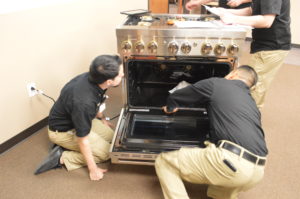You just sat down to enjoy a nice relaxing moment in silence when your refrigerator kicks in with this newfound noise that sounds like it’s headed to a different planet. Break – there goes your relaxing moment like the wind and now you have a new issue on your plate with your refrigerator. Let’s not get ahead of ourselves and go straight into panic mode – let’s try some troubleshooting tips and tricks (also provided in your Use and Care Guide provided by your manufacturer) based on the noises below that are normal:
- Buzzing or Clicking. If you have a water dispenser in your refrigerator, the water valve opens and closes to dispense water or to fill up your ice maker. This is normal if you have a water line hooked to your refrigerator. Not normal if you do not have a water line hooked up to your refrigerator.
- Running water or gurgling. This can be heard when ice melts during a defrost cycle and water runs into the drain pan.
- Popping. We’re talking about the refrigerator, right? This popping noise can be heard when the interior walls contract/expand, especially when your refrigerator is doing its initial cooldown.
- Cracking/Crashing. To keep your ice supply going, your refrigerator is constantly making ice. When it’s done with one tray, it will eject that ice from the ice maker mold.
- Rattle. Rattling can sometimes be present by items on a top shelf. It can also be present when water passes through your water line, or be based on your flow of refrigerant.
- Sizzle. If you’re running your refrigerator through a defrost cycle, water can tend to drip on the heater, thus, making a sizzle noise.
- Pulsating. During normal operation, the fans and compressors can adjust to optimize the performance of your refrigerator.
- Longer Run Times – With some makes and models you can also run into longer compressor run times – especially if they are energy efficient refrigerators. How does longer run time “save energy”? Compressors built today are built to work smart, not hard. What that means is that by running a longer cycle (80% to 90% of the time) it does not have to work as hard to maintain temperature, thus, saving energy.
If your refrigerator isn’t making any of the above normal noises, it’s best to call in the experts. Our technicians are professionally trained to handle noisy refrigerators and would be happy to assist. Thank you for letting our family help yours.




